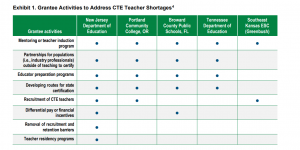Advance CTE’s “Research Round-Up” blog series features summaries of relevant research reports and studies to elevate evidence-backed Career Technical Educational (CTE) policies and practices and topics related to college and career readiness. This month’s blog highlights a study produced by the U.S. Department of Education’s Office of Career, Technical and Adult Education (OCTAE) on the impact of the High School CTE Education Teacher Pathway Initiative Grant. These findings align with Advance CTE’s vision for the future of CTE where each learner is supported by and has the means to succeed in the career preparation ecosystem.
![]() In 2017, the U.S. Department of Education’s Office of Career, Technical and Adult Education (OCTAE) launched the High School Career and Technical Education (CTE) Teacher Pathway Initiative (also referred to as CTE TPI). Last year, OCTAE published The Impact of the High School CTE Education Teacher Pathway Initiative Grant, a report on the outcomes of these three-year grants and the specific activities that the five grantees implemented to increase the pipeline capacity of high-school CTE teachers. These findings can inform state leaders on best practices for recruitment and retaining high-quality CTE instructors.
In 2017, the U.S. Department of Education’s Office of Career, Technical and Adult Education (OCTAE) launched the High School Career and Technical Education (CTE) Teacher Pathway Initiative (also referred to as CTE TPI). Last year, OCTAE published The Impact of the High School CTE Education Teacher Pathway Initiative Grant, a report on the outcomes of these three-year grants and the specific activities that the five grantees implemented to increase the pipeline capacity of high-school CTE teachers. These findings can inform state leaders on best practices for recruitment and retaining high-quality CTE instructors.
The study, conducted by the American Institutes for Research (AIR), focused on the following questions to examine the challenges and potential solutions encountered during grant implementation and to summarize grantee activities:
- What do grantees see as the major factors contributing to shortages of secondary CTE teachers in their state or community?
- How have grantees used CTE TPI funding to alleviate CTE teacher shortages?
- What challenges have grantees experienced in implementing their CTE TPI activities, and what strategies are they using to overcome those challenges?
- Are there early indicators of success in alleviating CTE teacher shortages?
Grants were awarded to two state departments of education, a regional education service center, a community college system and a school district:

Grantee Findings and Activities
In the first collection of data in 2019, grantees were surveyed about what they saw as the major factors influencing the shortages of secondary teachers in their state or community. The five major issues identified were:
- Disparities in compensation and work-life balance between in-demand industry positions and teaching
- Lack of higher education programs to train potential CTE educators
- Challenges navigating the CTE teacher licensure process and requirements
- The differentiated education and experience required to teach different CTE content areas
- Exams in teaching skills or content areas

The table above shows the activities pursued by each grantee with the following outcomes:
- New Jersey Department of Education: 53 industry professionals enrolled in an educator preparation program and 9 current teachers completed a program to help them transition to CTE teaching.
- Tennessee Department of Education: 61 teachers enrolled in new school district-led educator preparation programs, and 39 teachers and 30 mentors piloted a new regional mentoring model.
- Southeast Kansas Education Service Center: 165 new CTE teachers and 63 mentors participated in at least 1 year of a structured mentoring program.
- Portland Community College: 48 industry professionals and 27 current teachers transitioning to CTE teaching enrolled in an educator preparation program and community of practice.
- School Board of Broward County: 100 teachers gained certification in business education, computer science, or engineering and 23 teachers implemented a new CTE course.
Promising Practices for States
Chronic teacher shortages were only exacerbated by the COVID-19 pandemic and without taking immediate action, these gaps may continue to grow. The findings from this study speak to the variety of strategies that state and local CTE leaders can employ to increase the number of CTE instructors:
- Broad Professional networks: Establishing broader regional or statewide professional and/or mentoring networks through which new CTE teachers can access support from peers and more experienced CTE teachers is particularly important for new CTE teachers to combat what many teachers refer to as “professional isolation.”
- Tailored Mentorship: Mentorship is clearly a needed support, particularly when it is aligned with new CTE teachers’ content areas or tailored to meet the individual’s professional needs.
- Accessible Instructor Shortage Data: Grantees were unable to access systematic data regarding where and in what content areas high school CTE teachers are needed. This information must be collected from the district level, aggregated to the state level, and made accessible to coordinate an effective response to addressing staffing shortages.
- Proactive Certification Planning: Educational institutions that are interested in recruiting current non-CTE teachers for CTE positions can make advance planning for moving teachers into those roles an explicit component of their strategy. The investment of preparing teachers for certification and licensure might be most impactful when accompanied by an institution-level commitment to directly translate teacher preparation into expanded CTE programs and an increase in CTE course opportunities for students.
- Data Sharing through Partnerships: Whenever possible, grantees should solidify agreements with partners as partnerships launch or within grant applications that allow participant-level data sharing and a flow of information across organizations to monitor participant progress. This data sharing allows grantees to offer better support and enables flexibility in supporting CTE teachers.
For additional learning, visit Advance CTE’s Learning that Works Resource Center to access reports on how states can leverage Perkins V to Support Teacher Recruitment and Retention and State of the States 2022: Teacher Compensation Strategies.
Amy Hodge, Policy Associate
Tags: CTE Teacher pipeline, CTE teachers, Florida, kansas, New Jersey, Oregon, recruitment, tennessee

